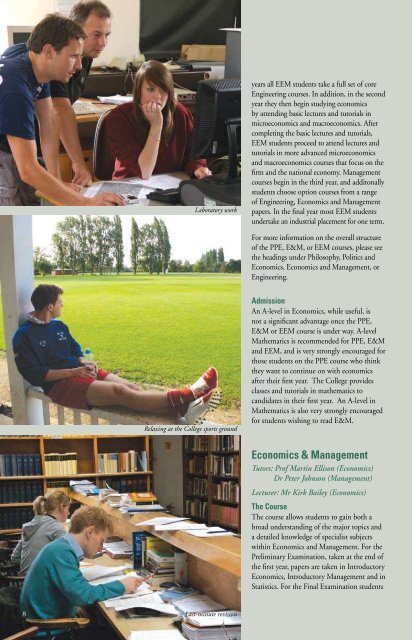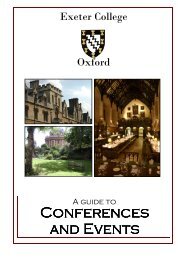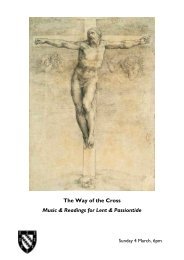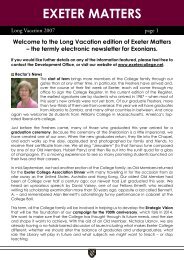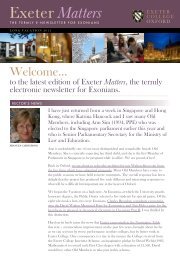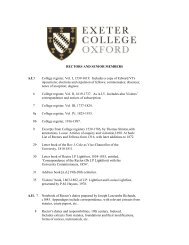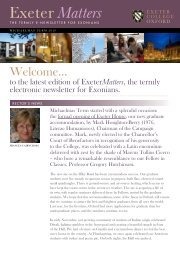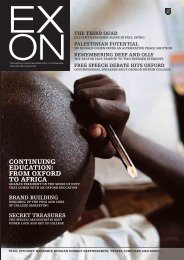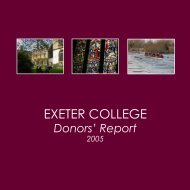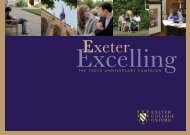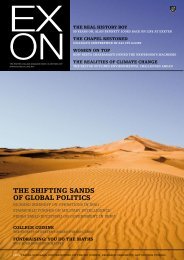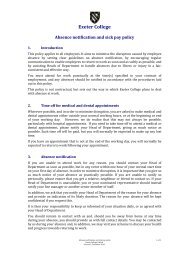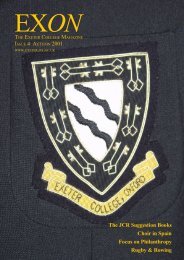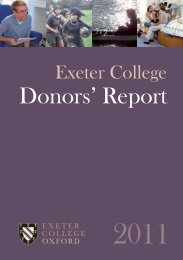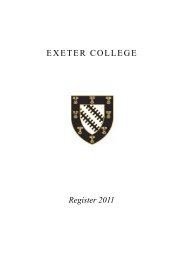Exeter Prospectus - Exeter College
Exeter Prospectus - Exeter College
Exeter Prospectus - Exeter College
- No tags were found...
You also want an ePaper? Increase the reach of your titles
YUMPU automatically turns print PDFs into web optimized ePapers that Google loves.
Laboratory workRelaxing at the <strong>College</strong> sports groundyears all EEM students take a full set of coreEngineering courses. In addition, in the secondyear they then begin studying economicsby attending basic lectures and tutorials inmicroeconomics and macroeconomics. Aftercompleting the basic lectures and tutorials,EEM students proceed to attend lectures andtutorials in more advanced microeconomicsand macroeconomics courses that focus on thefirm and the national economy. Managementcourses begin in the third year, and additonallystudents choose option courses from a rangeof Engineering, Economics and Managementpapers. In the final year most EEM studentsundertake an industrial placement for one term.For more information on the overall structureof the PPE, E&M, or EEM courses, please seethe headings under Philosophy, Politics andEconomics, Economics and Management, orEngineering.AdmissionAn A-level in Economics, while useful, isnot a significant advantage once the PPE,E&M or EEM course is under way. A-levelMathematics is recommended for PPE, E&Mand EEM, and is very strongly encouraged forthose students on the PPE course who thinkthey want to continue on with economicsafter their first year. The <strong>College</strong> providesclasses and tutorials in mathematics tocandidates in their first year. An A-level inMathematics is also very strongly encouragedfor students wishing to read E&M.Economics & ManagementTutors: Prof Martin Ellison (Economics)Dr Peter Johnson (Management)Lecturer: Mr Kirk Bailey (Economics)The CourseThe course allows students to gain both abroad understanding of the major topics anda detailed knowledge of specialist subjectswithin Economics and Management. For thePreliminary Examination, taken at the end ofthe first year, papers are taken in IntroductoryEconomics, Introductory Management and inStatistics. For the Final Examination studentsare required to sit eight papers: compulsoryEconomics papers (Macroeconomics,Microeconomics and Quantitative Methods)and optional papers chosen from a wideranginglist, at least two of which must bechosen from the Management list, whichincludes Marketing, Finance, Accounting,Strategy and Organisational Behaviour.For more information on Economics inE&M, please see Economics.AdmissionThe <strong>College</strong> admits between two andfour undergraduates for Economics andManagement each year. An A-level ineconomics is not required, but an A-level inMathematics is strongly encouraged.EngineeringTutors: Dr Ian ReidDr Nik PetrinicThe CourseThe Engineering Science and the Engineering,Economics and Management courses arefour-year courses, both leading to an MEngdegree. The first year is common to bothcourses, and with tutors’ permission it ispossible to switch between the two at the endof the first year. The Engineering Science (ES)course then covers a wide range of disciplineswith core papers in Maths, Electrical andInformation Engineering, Structures, Materialsand Mechanics, and Energy Systems. In thethird year and fourth years students beginto specialise, choosing options from a rangecovering all aspects of the core disciplines ofMechanical, Civil, Electrical, Informationand Control, Chemical and BiomedicalEngineering. In these years design and practicalprojects are also undertaken. All courses arefully accredited by the relevant Engineeringinstitutions.The Engineering, Economics andManagement (EEM) course combinesthe core material from the ES course withcourses in Economics and Management.Typically half of the fourth year is spent on amanagement placement within industry. SeeEconomics for further information.The <strong>College</strong> regards practical training asessential to every Engineer’s education andencourages all students to gain industrialexperience during the long vacations.Within the <strong>College</strong>, Dr Reid teachesMathematical, Electrical, Control andComputing subjects, while Dr Petrinic coverstopics in Mechanics, Structures and Materials.CareersAlthough many graduates find excellentcareers in Engineering, career prospectsare not confined to technology. Significantnumbers move into research, teaching orfinance and commerce. Others move on toManagement after a few years in Engineering.AdmissionFive or six students are admitted every yearto read ES or EEM. The required A-levelsare Mathematics and Physics, with a relatedthird subject. Though Further Maths can behelpful, it is not essential, and by the end ofthe first year there is no discernable differencein knowledge or ability between those whohave and have not taken Further Maths.EnglishTutors: Ms Jeri JohnsonDr Helen SpencerDr Ben MorganThe CourseThe Oxford English syllabus covers the entirespread of English Literature from Old English(“Anglo-Saxon”) to the present, as well as arange of special options as widely divergentas, for example, American Literature,Women’s Writing, Critical Theory, MedievalLatin, Classical Literature and various Celticlanguages related to English. The coreof undergraduate teaching is done in the<strong>College</strong>, but teaching can be arranged for anyof the options offered by the syllabus. Wedo our best to ensure that students’ specialteaching needs can be met.Teaching is principally by tutorials, but smallclasses, group discussions and lectures are alsointegral to the course.Undergraduate Subjects8Last-minute revision9


